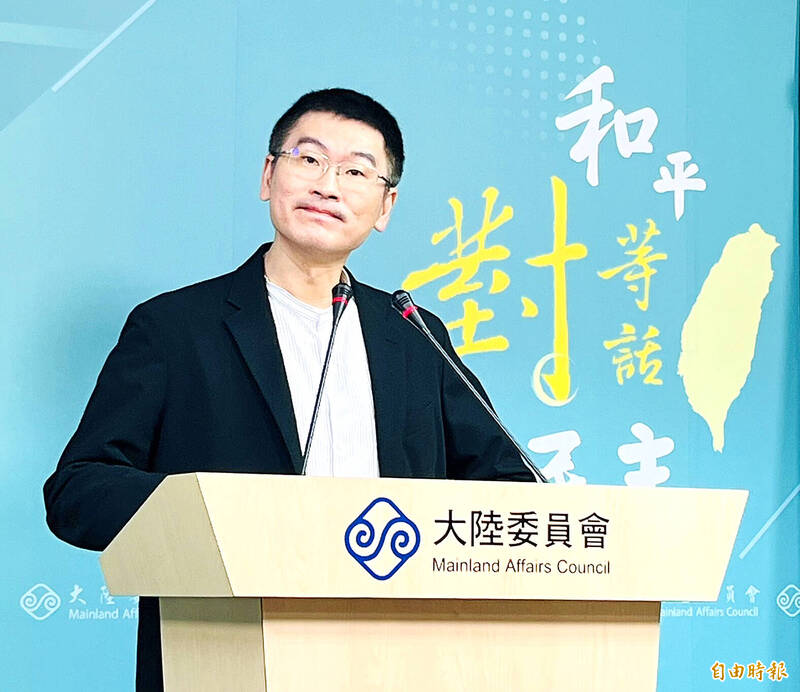《TAIPEI TIMES》MAC proposes court for national security-related cases

Mainland Affairs Council Deputy Minister and spokesman Liang Wen-chieh speaks at a news conference in Taipei yesterday. Photo: Chen Yu-fu, Taipei Times
By Shelley Shan / Staff reporter
A special court is needed to handle national security-related cases following discoveries of extensive Chinese espionage operations, the Mainland Affairs Council (MAC) said yesterday.
The council made the statement after seven retired Taiwanese military personnel, members of the Rehabilitation Alliance Party, were accused of receiving funding from China and recruiting veterans as key members of the party.
The party, which has been ordered to dissolve, has also been accused of recruiting people to contest legislative elections, photographing the American Institute in Taiwan’s headquarters and four military bases, drawing maps of the locations and giving them to China and planning to build armed forces to cooperate with China in the event of an invasion.
“We have been reminding our people that the purpose of the Chinese Communist Party [CCP] is to annihilate the Republic of China (Taiwan), which has been its goal since 1949,” MAC Deputy Minister and spokesman Liang Wen-chieh (梁文傑) told reporters at the council’s weekly news conference. “While it is necessary to continue countering ‘united front’ and infiltration efforts, the [Rehabilitation Alliance Party] case shows that there are many loopholes in the legal system when it comes to national security issues.”
Most defendants in national security cases receive relatively light sentences, as judges are often overly fixated on the language the defendants use, he said.
For example, the Rehabilitation Alliance Party members said they are a social group called the “New Fourth Army Society” dedicated to the study of an entity of the Chinese Nationalist Party’s (KMT) army during World War II, Liang said.
The name does not evoke the idea that it is affiliated with the CCP, and judges might not consider the exchange of money for information to be espionage, he said.
“Its members hide their identities and there is no way to verify who they are with China,” Liang said. “While the Investigation Bureau is working hard to crack down on Chinese espionage operations, we hope that the judicial system would advance by treating national security incidents as special cases and establish a dedicated court to review them.”
In other matters, Liang said that two Chinese academics who study Taiwan are visiting to meet with experts at the Institute for National Policy Research and the Foundation of Asia-Pacific Peace Studies.
The council would arrange an opportunity to meet with the academics, he said, but refused to disclose any specific matters that it would discuss, simply saying they are cross-strait issues.
Separately, the Investigation Bureau on Wednesday said that there are Taiwanese who hold Chinese ID cards and Chinese household registration certificates, adding that it has informed the Ministry of the Interior about the matter.
If a Taiwanese has household registration in China, or holds a Chinese passport or ID card, the Act Governing Relations Between the People of the Taiwan Area and the Mainland Area (兩岸人民關係條例) stipulates that their household registration in Taiwan be canceled, meaning they would lose their citizenship rights, including to vote and to access the National Health Insurance system.
Income earned by Chinese in Taiwan would be targeted by tax collectors in China, the bureau said.
In a YouTube video discussing China’s “united front” tactics produced by Taiwanese rapper Chen Po-yuan (陳柏源) and YouTuber Pa Chiung (八炯), Lin Jincheng (林金城), head of the Taiwan Youth Entrepreneurship Park in Quanzhou in China’s Fujian Province, said that 200,000 Taiwanese hold Chinese ID cards.
新聞來源:TAIPEI TIMES





















